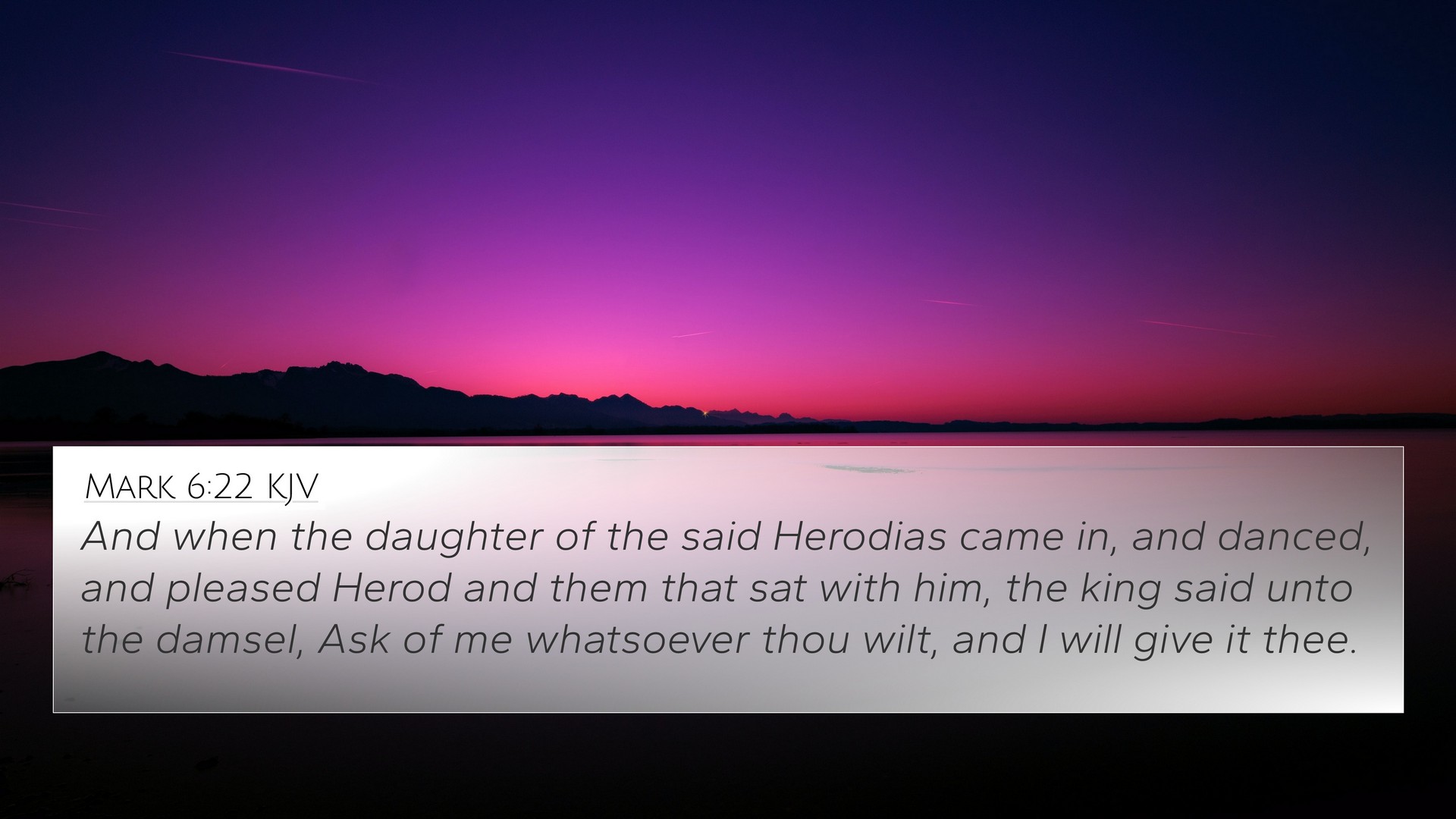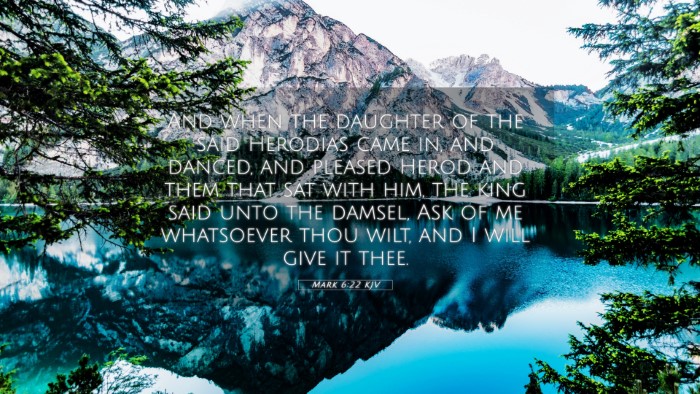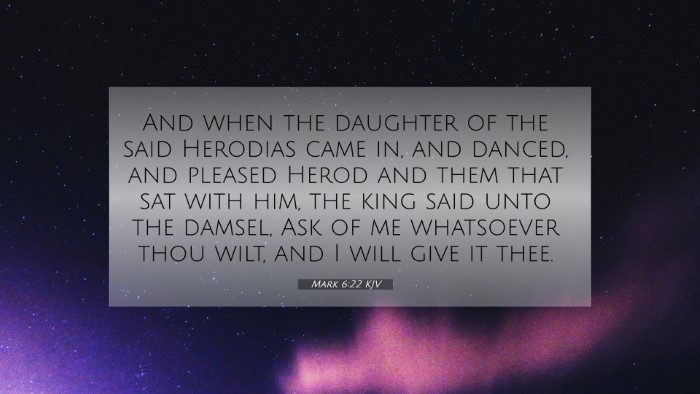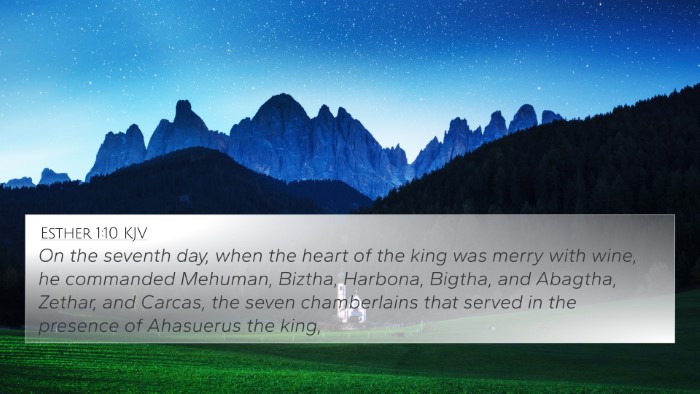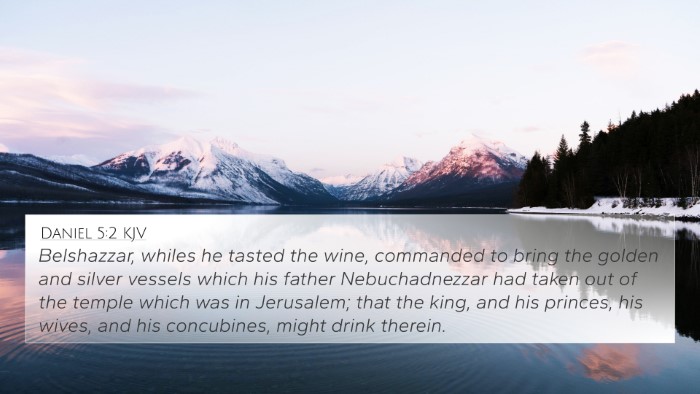Understanding Mark 6:22 - A Comprehensive Analysis
Mark 6:22 states: "And when the daughter of the said Herodias came in, and danced, and pleased Herod and them that sat with him, the king said unto the damsel, Ask of me whatsoever thou wilt, and I will give it thee." This verse stands at a complex intersection of power, manipulation, and moral failure, reflecting both personal and political themes that are prevalent in the biblical narrative.
Contextual Overview
This event unfolds during a banquet hosted by King Herod Antipas, where he is entertained by the daughter of Herodias, his unlawful wife. The context is critical for understanding the actions of the characters and the implications of Herod's promise. Public domain commentaries shed light on the motivations behind their actions, which are steeped in vice and ambition.
Comparative Bible Verse Analysis
When examining this verse, we discover valuable connections to multiple biblical themes:
- Power and Influence: Herod’s offer to grant any wish reflects the intoxicating nature of power.
- Moral Corruption: The actions of Herod and Herodias demonstrate a spiral into moral decay influenced by desire and revenge.
- Consequences of Actions: The outcome of this promise leads to the beheading of John the Baptist, emphasizing the heavy consequences of careless words and actions.
Bible Verse Cross-References
Several scripture references help to contextualize and deepen the understanding of Mark 6:22. These verses illustrate the interconnectedness of biblical texts and enhance our interpretation:
- Matthew 14:6-10: Similar account detailing Herod's promise and subsequent beheading of John the Baptist.
- Luke 3:19-20: John's condemnation of Herod highlights the corrupt moral landscape.
- James 1:15: Explains how lust leads to sin and sin leads to death, paralleling Herod’s influence.
- Proverbs 10:22: The blessings of God make one wealthy, contrasting with Herod's destructive indulgences.
- Matthew 5:37: Jesus’s teaching on honesty underscores the need for integrity in one’s promises, unlike Herod’s flippant vow.
- Galatians 6:7: The principle of sowing and reaping relates to Herod's ultimate demise due to his immoral choices.
- Psalm 37:32-33: God’s protection over the righteous, contrasting with Herod's fate.
Thematic Bible Verse Connections
The themes of temptation, moral degradation, and consequence are prevalent in both the Old and New Testaments. A thorough understanding reveals:
- Temptation and Sin: Genesis 3 recounts the fall of man due to temptation, paralleling Herod’s succumbing to the allure of power and pleasure.
- Judgment: The prophetic voices in the Old Testament warn against kings who act unjustly, seen in Jeremiah 22:1-5, relevant in assessing Herod’s leadership.
- Wisdom: Proverbs 8:12 speaks of wisdom, which was absent in Herod’s choice, leading to dire outcomes.
Tools for Bible Cross-Referencing
To navigate the interconnectedness of the scriptures, employing tools such as a Bible cross-reference guide or a Bible concordance proves invaluable. These tools aid in:
- Finding Cross-References: Identifying key themes that link different verses.
- Understanding Context: Gaining perspective by exploring surrounding scriptures that inform the meaning of a verse.
- Comparative Study: Conducting detailed studies on how various books of the Bible relate thematically.
Conclusion
In summary, Mark 6:22 not only presents a narrative about a king's moral failure but also interconnects with broader biblical themes and principles. By examining cross-references and drawing thematic connections, one can appreciate the depth and relevance of this verse within the grand biblical narrative. For anyone seeking to understand and explore the profound relationships between Bible verses, the insights derived from this analysis illuminate the intricate tapestry of Scripture.
